SCHOOL Boos.—Facts and Features of English History. By John Hill.
(Marshall.)—This is an effort made, not without some intelligence, and attaining a certain success, to "compress the History of England into a small compass." Memory Lessons" are given, being summaries "of facts and dates, and then comes a reading lesson, which gives an account
of what the author conceives to be the loading event of the epoch. Of course there must be considerable divergence of opinion about these leading events. The reading lesson for Edward L's time, for instance, is the "Conquest of Wales." We should have preferred to see a. sketch of the whole subject of which this is a part, Edward's efforts at bring- ing about the unity of the island. It is not every student who knows thus to connect the great King's proceedings together. We doubt whether Mr. Hill is quite well informed, for he talks about the "active spirit and ambition of Edward" leading him to attempt the conquest of Wales and Scotland. Of course he would not have attempted it had he not been active, spirited, and ambitions, but there was a much deeper reason for his policy than what these words suggest.—In English literature we have the Fourth Book of Milton's Paradise Lost, by the Rev. John Hunter (Longman). Mr. Hunter furnishes his readers with a prose paraphrase and notes, which will save him the trouble of using books of reference. When ho deals with questions of grammar, we do not think the notes always satisfactory. So when we come to the
passage,— " Lifted up so high.
Would set me highest, and in a moment quit I scorned subjection, and thought one step higher The debt immense of endless gratitude, So burdensome still paying still to owe, Forgetful what from him I hacl received,"
we question the correctness of the annotation, "So burdensome, ike. Still paying, still to owe, was so burdensome," preferring to make "bardonsome " dependent on "debt," and to take the following words as put in a kind of explanatory apposition. As to saying of the next line that "what from hint I had received" is an objective of respect, it seems a more hiding of difficulty under a gratureatioal techni- cality. Milton doubtless, had in his mind the Latin oblitus, with a clause dependent upon it. For understanding Milton there is nothing like translating him into Latin. From the same editor and publishers we have also King Henry VI., Part L, with Notes Explanatory and Critical; and King Limy VI., Part II. —We have also received Easy Steps in English Composition, by J. S. Laurie, and Outlines of Analysis. (Marshall).—In geography we have to mention Physical Geography adapted to the Requirements of the Science and Art Department, by John Macturk (Collins) ; Geography for Elementary Schools, by E. Hughes, a now edition (Longmans); and Primary Geography, in a Series of Progressive Lessons, Parts 1-3 (Marshall). Of this last we must observe that it is not always correct. The population of London is given at 3,008,101, whereas it should be (by the census of 1871) 3,254,260; and in the "chief towns having less than 50,000 inhabitants " some noteworthy places are omitted ; Croydon, a gigantic suburb of London, with nearly 60,000 inhabitants ; Bath, after Brighton, the largest pleasure town in England ; and Exeter and Reading, the two most populous country towns in the South of England.—Wo have also to mention An Analysis and Exposition of the Church Catechism, by the Rev. 0. Bartle, D.D., fourth edition (Longman) ; Short Notes to Selected Orations of (,'icero (Parker), one of a very useful and woll-exoCuted series; and Casar de Bello Galileo VI., by Dr. White, one of the series of "Gram- mar-School Texts" (Longman).—In Natural History and Science we have an Advanced Text-Book of Physical Geography, by David Page, LL.D., second and enlarged edition (Blackwood); and a Catechism of Zoology, by the Rev. J. F. Blake, MA. (Longman.)—We wonder which is the more reasonable thing to set boys to learn, that " verbs of asking, teaching, &c., govern two accusatives, one of the person, the other of the thing," or this, "Why are the Perissodactyla and Art iodactyla so called ? B3cause the Porissodactyla have an odd number of toss (ono or three), and the Artiodactyla an even number (two or four). What other distinction have they ? The horns, if present, are not paired in the Perissodactyla (and their femur has a third trochanto r)." By the way, is "one "really an odd number? —In Garman we have The Marlborough German Grammar, by the Rev. J. F. Bright (Cassell and Co.); and German Chit-Chat, by L. E. Wirth (Longman), described as "a collection of conversations devised for the purpose of teaching English learners how to talk in the German language."—A.mong the miscel- lanies of education most be reckoned A Manual of Gesture, by Albert M. Bacon (Chicago, U.S.: Griggs. London: Triibner); and A Music Primer for Schools, by the Rev. J. Troutbeck and the Rev. Reginald P. Dale (Clarendon Press).


































 Previous page
Previous page